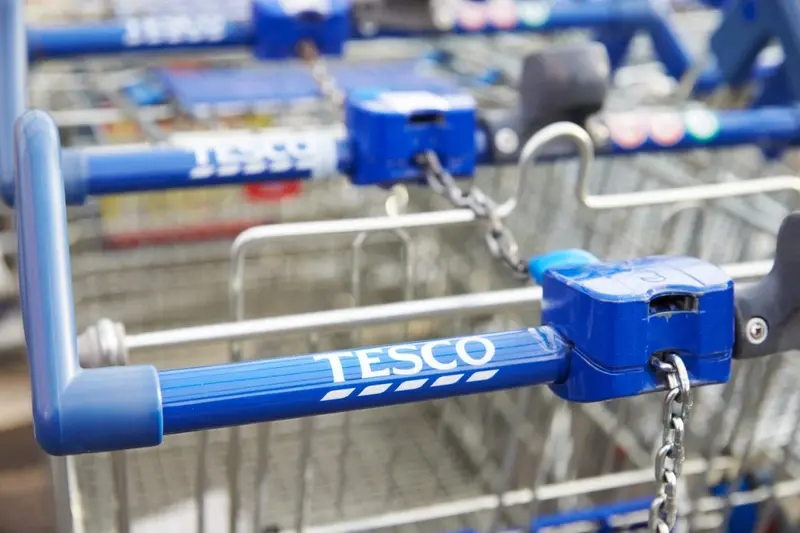
Shares in grocery giant Tesco (TSCO) have shot up 5.2% to 186.2p as the Competition and Markets Authority (CMA) has provisionally approved the supermarket’s £3.7bn acquisition of wholesaler Booker (BOK). Shares in the latter name also jump by 5.2% to 208.9p on the news.
The CMA nod provides a further fillip for Dave Lewis-led Tesco, which last month issued impressive half year results confirming its hotly-anticipated resumption of dividend payments to shareholders.
Following an in-depth review, the CMA ‘has provisionally concluded that Tesco’s purchase of Booker does not raise competition concerns’, a remark that will no doubt infuriate rivals of the pair, since the deal brings together the UK’s biggest grocery retailer and its largest grocery wholesaler.
SUFFICIENT COMPETITION
Nevertheless, the competition watchdog has found that Tesco as a retailer and Booker as a wholesaler do not compete head-to-head in most of their activities.
In particular, it notes that Tesco does not supply the catering sector to which Booker makes over 30% of its sales.
Moreover, the CMA, ‘recognising that Tesco’s shops nevertheless compete with Booker-supplied shops’, considered the impact of the merger in every local area where a Tesco and a Booker-supplied shop are both present (over 12,000 shops).
It did this to examine whether, in any of these areas, it might be profitable for the merged company to raise prices or reduce service levels either in retail or wholesale.
The CMA has provisionally concluded that the level of competition in the grocery wholesale and retail markets would be ‘sufficient to defeat such a strategy’.
Competing wholesalers have complained the deal will lead to Tesco-backed Booker benefiting from improved suppliers’ terms, making it tough for them to compete. In turn, Booker might eventually raise prices to the shops it supplies.
Yet the CMA found that it was ‘likely Booker would be able to negotiate better terms from a number of its suppliers for some of its groceries, and that it was likely to pass on some of the benefits of these savings to the shops that it supplies. This might increase competition in the wholesale market, as well as reducing prices for shoppers.’
THE EXPERTS’ VIEW
Is this mega-deal designed to boost growth or create it?
AJ Bell Investment Director Russ Mould points out that ‘Tesco and Booker operate in mature markets and there is therefore a suspicion that the idea is to create growth where little exists, while the vast majority of merger and acquisition (M&A) deals fail to deliver the targeted revenue or cost benefits’.
On whether or not Tesco is paying the right price, Mould comments: ‘The offer of 0.861 Tesco shares plus 42.6p in cash plus any dividends due before the deal closes equates to around 210p per Booker share, or 20 times earnings.
‘That’s a big premium to the 14 to 15 times multiple currently attributed to the broader UK market, which looks very full for a business that has a fairly skinny 3.3% full-year operating margin and operates in a competitive, mature market.’
Mould adds: ‘Tesco says the deal will be earnings accretive after two years, but this excludes implementation costs and assumes all synergies are met so the price offered for Booker leaves little margin for error, especially as Tesco still has its hands full in dealing with competition from Aldi, Lidl, Morrisons (MRW), Sainsbury's (SBRY) and others.’
BATTLING BACK
As Shares outlined here, Tesco’s half year figures confirmed Britain’s biggest retailer is successfully battling back against Big Four rivals and Aldi and Lidl. Pre-tax profits surged from £71m to £562m, while in the core UK and Republic of Ireland (ROI) business, like-for-like sales grew 2.1% for a seventh consecutive quarter of positive performance.
The latest grocery market share figures from Kantar Worldpanel show supermarket sales increased in value by 3.2% year-on-year in the 12 weeks to 5 November, with price rises keeping supermarket performance buoyant.
According to Kantar, Tesco sold products to 76% of British households during the past 12 weeks, growing sales by 2.3%, although its market share dipped to 28%, down 0.2 percentage points on last year.




